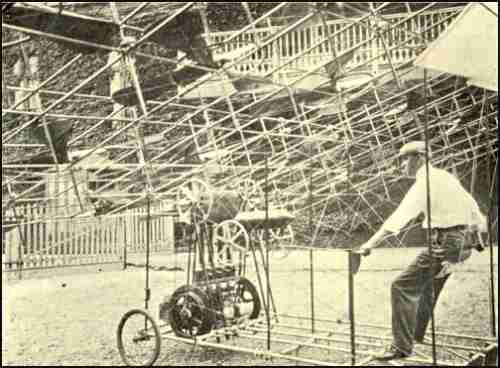
-1940 |
 |
|
For his helicopter, Mr. Kimball had obtained a very light and remarkable motor, one of the first that was ever built in this country specially for aeronautical purposes, designed by Mr. Geo. J. Altham. It was a four cylinder, 4 in. by 4 in. two-cycle engine, develop- ing 50 h. p. at 2,000 r.p.m., and weighing, with water-cooling system and magneto, 180 lbs. However, it could then be run only at very high speed, and, though admirably suited for an aeroplane, did not answer for the very intricate transmission required to drive twenty propellers by wire cable. Consequently after months of work, Mr. Kimball put his helicopter aside to await another motor, and the point has yet to be settled whether or not the blade area of a score of small propellers acting horizontally forms as effective and safe a support as the ordinary rigid surface of an aeroplane. Editor's Note: You will find many references to Kimball in the Bulletin of the Aeronautical Society. |
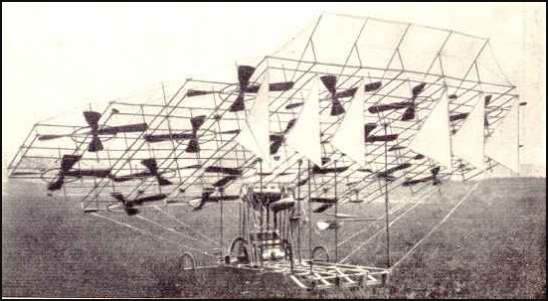 |
|
Collection of Jean-Pierre Lauwers |
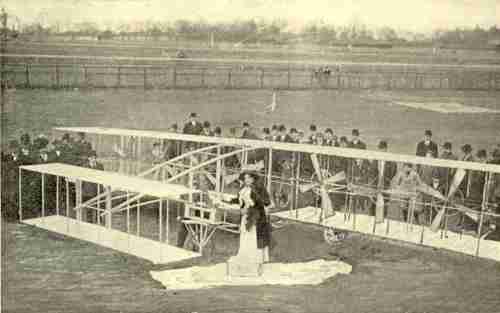 |
| The Kimball Aeroplane Photo Edwin Levick, N. Y. |
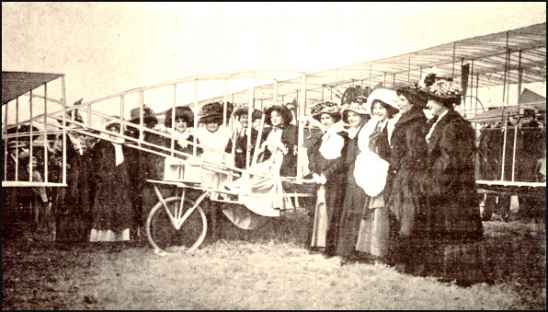 |
|
It shows the lady from the photo above, now seated in the pilot's seat. Collection of Jean-Pierre Lauwers |
| The months of January, February, and March were marked by activity in the building of the Kimball aeroplane. This was the first aeroplane that was entirely constructed and finished in the workshops of the Society, and that circumstance lent it added interest. Like all Mr. Kimball's machines, his biplane was conspicuous for its striking originality, the great amount of thought it displayed, its simplicity in its theory, and its complexity in application. The main surfaces were 37 ft. by 6 ft. 6 in., and the front horizontal rudder was 12 ft. by 2 ft. 6 in. and placed 9 ft. 9 in. ahead of the main planes. But its principal features were that it had no rear rudder; no projections back of the main body; was to depend for turning on lateral slats on the rear outside edges working something like the laths of a Venetian blind, and on side planes forming normally the extreme panels of the main surfaces, hinged on the front edges; and was to be driven by eight propellers, which were 3 ft. 10 in. in diameter and 4 ft. pitch, and placed in a row in between the main surfaces and well advanced inside of the rear or feathering edges of the surfaces. |
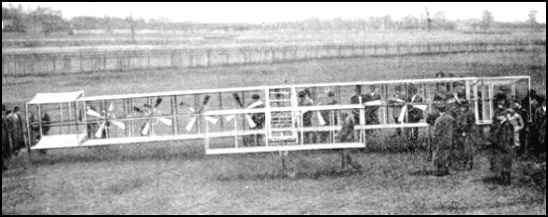 |
|
|
|
It took some months to work out the transmission problem of the eight propellers.
As in the helicopter, they were driven by a small wire cable. Most of the experts declared
that the difficulty of such a complex transmission never could be solved. Mr. Kimball
bravely sacrificed set after set of his beautifully made and costly little four-bladed
propellers; but he overcame the trouble in the end. The difficulty was really due to the
terrific starting speed of his motor. The use of a friction clutch, made by a fellow member, Adrien C. Beckert, solved the problem
Editor's Note: You will find many references to Kimball in the Bulletin of the Aeronautical Society. |
|
May 30, 1915. T. R. MacMechan, as general manager of a British company, had at this time about completed a RIGID AIRSHIP designed as a Zeppelin Destroyer. With him in England was EB Wilbur R. Kimball as engineer, and other assistant. The ship was the design of Walter V. Kamp, who remained in America to fabricate certain parts, the framework being constructed of veneer according to the Kamp system. courtesy of Steve Remington - CollectAir |
|
I have found three brief references to Wilbur Kimball on the net. You may access the AeroFiles site by clicking on: Kimball You may want to use the "Find" function on "Kimball". |
|
From The Early Birds of Aviation Roster of Members January 1, 1993 If you have any information on this Early Bird, please contact me. E-mail to Ralph Cooper Back 

|